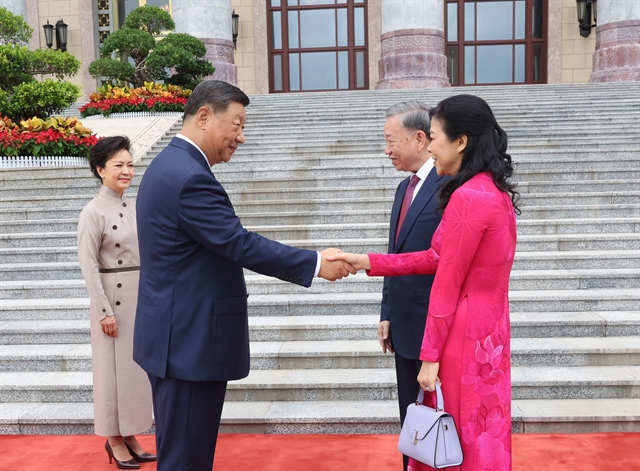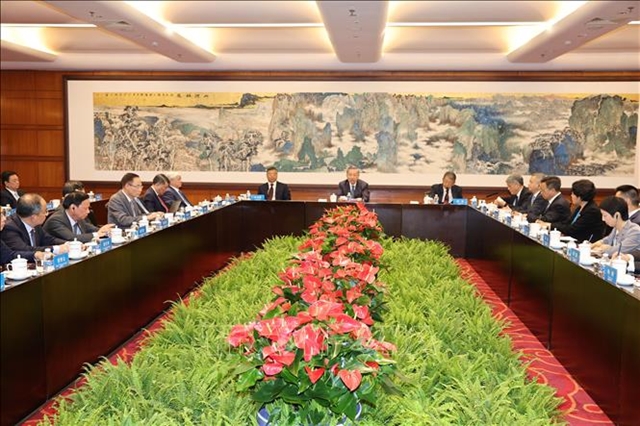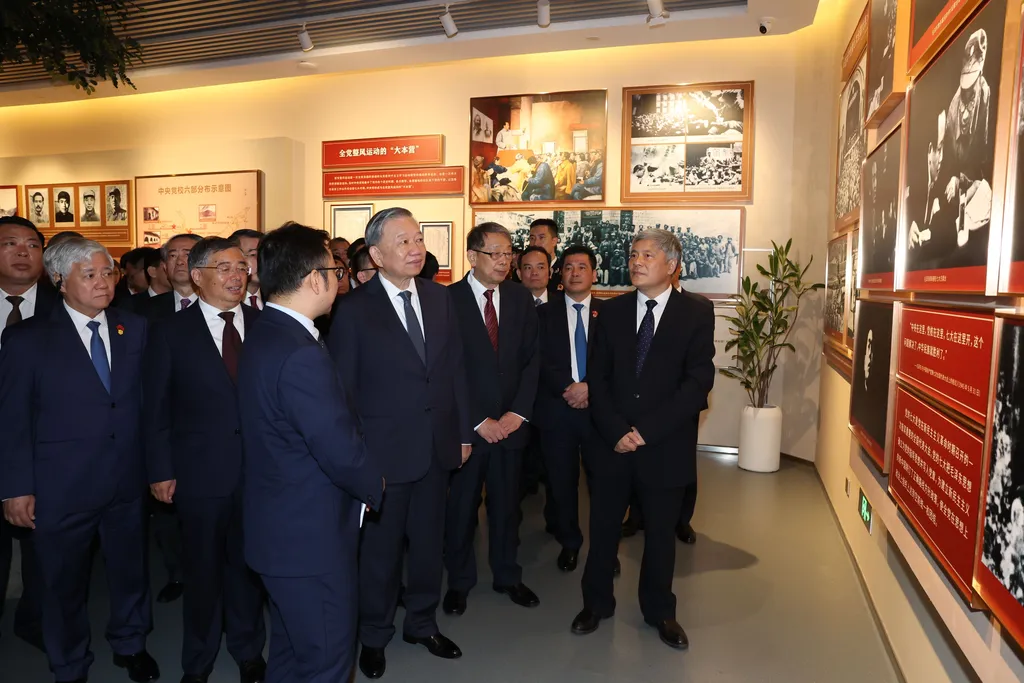 Politics & Law
Politics & Law

 |
| General Secretary of the Communist Party of Việt Nam (CPV) Central Committee and State President Tô Lâm visitedthe Central Party School of the Communist Party of China (CPC) in Beijing. — VNA/VNS Photo |
BEIJING — General Secretary of the Communist Party of Việt Nam (CPV) Central Committee and State President Tô Lâm visited and had a working session with the Central Party School of the Communist Party of China (CPC) in Beijing on Tuesday morning as part of his state visit to China.
The meeting was attended by Li Shulei, Politburo member, Secretary of the CPC Central Committee’s Secretariat and head of the CPC Central Committee’s Publicity Department, along with leaders, professors, lecturers, and students of the school.
The Chinese Central Party School provides training for medium- and high-ranking officials, as well as cadres working on youth affairs from across China. It holds an important position in the research, popularisation, and promotion of the CPC’s ideology. It serves as a national research institute for social sciences and philosophy, and also a new-style high-level advisory body with Chinese characteristics.
General Secretary of the CPC Central Committee and President of China Xi Jinping, as well as preceding leaders of the country like Mao Zedong and Liu Shaoqi, used to act as rectors of this school.
 |
| Party General Secretary and President Tô Lâm visits the Central Party School of the Communist Party of China in Beijing on August 20. — VNA/VNS Photo Trí Dũng |
Addressing the meeting, General Secretary and President Tô Lâm said that with its significant contributions and outstanding achievements, the school has gained a large number of good experiences in all aspects, from researching, teaching, training, and building of the cadre contingent to innovation, technology application, and development promotion, which is a good source of reference for Việt Nam.
He noted as the one who founded, led, and trained the CPV, late President Hồ Chí Minh always affirmed that personnel and personnel affairs form a critically pivotal and urgent issue that affects everything, and that personnel are the roots of all jobs, so training personnel is the root work of the Party.
Inheriting and developing the thought of Hồ Chí Minh, personnel and theoretical affairs are always among the fundamental issues to which the CPV attaches special importance throughout its congresses.
Personnel, cadre training, and theoretical affairs also received special attention from late General Secretary of the CPV Central Committee Nguyễn Phú Trọng, a particularly excellent leader of the Vietnamese Party and State, a staunch and prestigious Party member, a brilliant example of studying and following Hồ Chí Minh’s thought, morality and style, a keen theorist, and also a great friend of the Chinese people as General Secretary and President Xi described, according to Lâm.
He emphasised that over the past years, cooperation between the Chinese Central Party School and Vietnamese partners, including the Hồ Chí Minh National Academy of Politics, has been unceasingly consolidated and developing extensively.
The two schools have worked together for more than 30 years, since 1993, with a wide range of activities. Their cooperation has obtained many outstanding results, directly helping the Vietnamese academy improve its research and teaching capacity, and also reform its training framework and methodology along with policy research and consulting. That has helped enrich the theoretical achievements of the two Parties and contribute to the enhancement of bilateral cooperation, the Vietnamese leader added.
Lâm briefed the participants on major tasks of the Vietnamese Party in the time ahead, including preparations for the 14th National Party Congress.
Regarding the freshly-signed memorandum of understanding between the Chinese school and the Hồ Chí Minh National Academy of Politics (HCMA), he suggested them step up exchanges, and the sharing of theories on Party building and national management, as well as experience in personnel training and theoretical research.
The two sides should co-organise workshops on scientific research, both online and offline, he continued.
Stressing Việt Nam's demand for improving the capacity of its officials and Party members, especially managers, the leader suggested the Chinese school help with the work through flexible forms.
Writing in the guest book, Lâm expressed his belief that the school will carry forward its traditions to outstandingly complete the tasks and missions assigned by the CPC Central Committee, and his wish that the relations between the school and its Vietnamese partners will grow more intensively, effectively and practically, contributing to fostering the Việt Nam-China comprehensive strategic cooperative partnership, and building the Việt Nam-China community with a shared future that carries strategic significance.
Also on Tuesday morning, Party General Secretary and State President Tô Lâm and the Vietnamese delegation visited MEGVII technology company in Beijing.
Founded in 2011, MEGVII is a leading technology firm specialising in artificial intelligence (AI) products and solutions. The company employs nearly 3,000 employees and operates research and development centres in Beijing, Shanghai, Shenzhen, Wuhan, Nanjing, and Chengdu. MEGVII's commercial products have supported hundreds of thousands of developers and served over 3,000 clients worldwide.
So far, MEGVII has won 28 global AI competitions, owned about 1,900 patents and has contributed to the development of 33 AI industry standards in China.
The company has also collaborated with universities to establish talent training facilities and develop educational programmes. MEGVII’s research institute in visual computing is renowned for its leading global scale and extensive academic relationships with research institutions around the world, achieving widely recognised technical milestones.
With its advanced research capabilities and practical expertise in AI, MEGVII has established an integrated AI product system that combines hardware and software, providing industry solutions for the Internet of Things (IoT) and other sectors. — VNS

.jpg)


